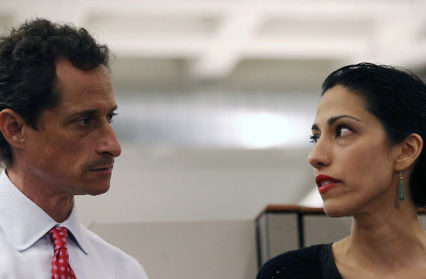Craig Austin casts a critical eye over the new documentary screened at the Sundance Film Festival, Weiner, examining the disgraced American politician Anthony Weiner.
London’s lavish Picturehouse Central is something of an incongruous beast, located as it is in the cross-hairs of an artless West End pincer alliance of The Rainforest Café and M&M World; a stretch of comically insufferable pedestrian chaos at the edge of Leicester Square that I’ve occasionally been known to characterise as ’Kafka’s Corner’.
Its core constituency of borderline-obsessive cinephiles nevertheless feels like the perfect target audience for Sundance Film Festival: London, the UK offshoot of Robert Redford’s Sundance Film Festival. A long weekend of cinematic thrills that showcases the UK premieres of some of the most anticipated movies and docs from its hugely influential Utah mother-ship.
It’s a gloriously sunny Sunday afternoon so naturally I opt to grab myself a couple of hours of Weiner in a darkened room. Not to be confused with Todd Solondz’s Weiner-Dog, another highlight of this long weekend, this splendid fly-on-the-wall documentary film trails former New York mayoral hopeful Anthony Weiner on a 2013 campaign trail that is initially positioned as a potentially redemptive political comeback but which finds itself increasingly consumed by the immovable residue of an all-too public ‘sexting’ scandal that swiftly curtailed a highly promising career in Congress. Many politicians have seen their careers crash and burn but few have been captured so completely on film or with such a degree of inadvertent hilarity.
Weiner begins by presenting an initial set-piece of rapid-fire TV imagery that seeks to portray the youthful Congressman as a righteous blood-and-thunder champion of social justice and progressive political engagement, his tirade against the GOP’s shameless attempts to defeat a bill that would have provided up to $7 billion in aid to those sickened by toxins resulting from the 9/11 attacks being especially inspirational. It’s a montage that nevertheless ends with a jarring smack of 21st century reality, the now infamous viral image of the Congressman’s bulging underwear; almost certainly the only reason why a UK audience will even have heard of Anthony Weiner.
An aspiring political career undone by the salacious appetite of a political discourse only interested in the society of the spectacle, or the age-old cliché of (middle-aged) man’s vanity being his drearily predictable undoing? Weiner does not explicitly seek to answer either question definitively. Instead its compelling power lies in its astonishing, unprecedented (often baffling) degree of personal access and its intermittent scenes of uncomfortable human interactions that increasingly consume its key players in a fug of stifling personal compromise. ‘Why have you let me follow you?’ Weiner’s director asks the politician poignantly during a particularly emotive scene in the back of a campaign car; a plaintive question that audiences will be bursting to ask almost from the film’s outset.
‘Obama Beats Weiner’
‘Weiner Sticks It Out’
‘Same Old Schlong And Dance’
– The New York Post, always The New York Post
The Canadian philosopher Marshall McLuhan once proclaimed that ‘the name of a man is a numbing blow from which he never recovers’. Anthony Weiner, much like our former Chancellor Ed Balls, is all too aware of the damage an unfortunate moniker can wreak upon one’s most vulnerable years. Balls is on record as stating that it’s the sole reason why the decision was taken to bestow upon his children their mother’s surname. Yet while Balls and Weiner both share a reputation for public Twitter-based incompetence only one of these men actively sought to entice young women using the alter-ego ‘Carlos Danger’. And as human nature has consistently decreed through the ages, you only have to be Carlos Danger once to be Carlos Danger until the day that you die.
‘I lied to them’ Weiner reflects, when considering why he is so vilified by the media, ‘I have a funny name’, he pauses, ‘and they just don’t know how to do nuance’. The media’s failure to engage with – or even understand – nuance is one of the film’s central themes, a wretched contemporary reality that Donald Trump has successfully exploited for his own increasingly venal ends. Though while more intrinsically cerebral politicians may recoil from the new rules of engagement, to ignore them completely is to withdraw from the prevailing political fray.
Like it or loathe it, the terms on which the US (and increasingly the UK) discusses its politics is being rapidly redefined. Anthony Weiner is not a man to duck a confrontation and despite his inner convictions, and at his most effective, he can roll with the punches of the best of them; his cocky, often overtly confrontational, stance a trait of his innate New York chutzpah. Yet what Weiner also slowly reveals is the often destructive and oppressive impact of his naivety and narcissism upon those who have invested both trust and belief in him – the disenchanted campaign workers, the exasperated political advisors, the steadfast yet publically compromised partner.

Huma Abedin, a long-term aide to Hilary Clinton and her Deputy chief of Staff at the State Department, is perhaps the most fascinating character within this unseemly and at times comically bizarre saga. Weiner is as much her story as it is her husband’s, given that his personal transgressions reduced her equally to the role of press caricature.
A single-minded political powerhouse transformed into a talk-show punch-line at the click of a mouse, her personal decision not to walk away from her marriage (as so many publicly urged her to do) presented as an archaic ‘stand by your man’ betrayal in itself. During a post-screening discussion with Weiner’s co-creators Josh Kriegman and Elyse Steinberg it is fascinating (thought somewhat understandable) that despite being offered a pre-release screening of the film both Weiner and Abedin declined, stating that they both wished to move on from this particular period of their lives. It’s hardly surprising given the degree to which the fractured dynamic of their marriage was subject to such microscopic scrutiny.
Weiner undoubtedly has star quality. He is charismatic and witty with a keen sense of the absurdity of the entire political circus and Weiner gives its audience the sense that he, like his marriage, is likely to survive this period of public flagellation. It’s a prospect that is perhaps best personified by a tragicomic scene at the film’s conclusion in which a wildly excitable phone-wielding ten year-old struggles to deal with the evident thrill of being in the presence of the Anthony Weiner media carnival.
‘You’re him, aren’t you?’ he squeals, ‘You’re Anthony Weiner!’ before informing the politician that he plans to look him up on Wikipedia.
By way of response, Weiner does not miss a beat: ‘I’d strongly encourage you not to do that’ he deadpans.
Weiner gets its UK release via Dogwoof on July 8th.













